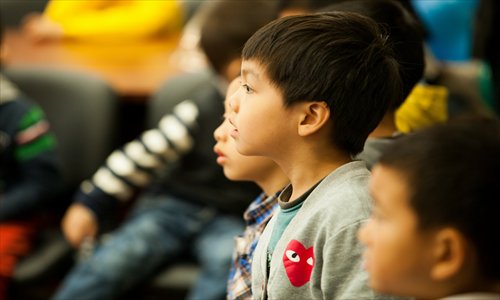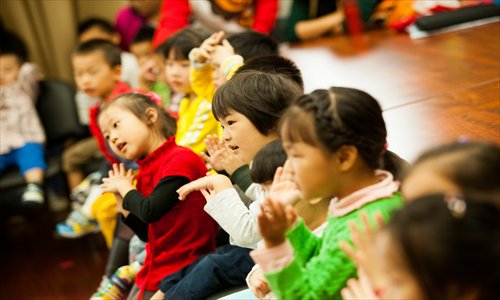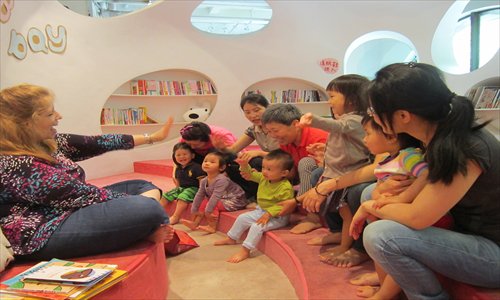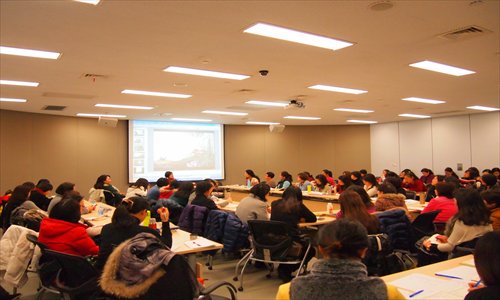Books are not baby talk


On Monday afternoon, 30 volunteers sat in a meeting room at the Tangqiao Community Cultural Activities Center in Pudong New Area, learning how to read aloud for children. They are the first volunteers for a program that is setting out to change the way Chinese read books to their children.
Traditionally, spurred by a drive to boost their children's educational intake, parents have used reading times as a quasi lesson period - as the story unfolds the children are often peppered with questions about the book to ensure that they are paying attention. For children it is often just another lesson, not an enjoyable pastime.
The government-backed Shanghai Oriental Digital Community began a pilot project at the Daning community center in Zhabei district on October 19. Every Saturday, two women from the Taiwan-based Hsin-Yi Foundation's Shanghai branch, one of the project organizers, read to groups of children aged from 3 to 6. There are four groups of up to 20 children and each session runs for about 90 minutes. After they read their stories the women then help the children with handicrafts like drawing and paper cutting.
Cao Minjie works with the Shanghai Oriental Digital Community and explained: "We found there was a real demand for these sort of reading sessions - young parents are now paying a lot more attention to helping their children develop a reading habit from an early age. So we started this program giving parents and children a relaxed space for reading."
After recruiting and training volunteers, the organizers plan to open reading corners in their 305 branches in community centers across the city. Several other groups and individuals have been promoting reading for children activities for some time now but this is the first government-backed organization to take up the cause citywide.
A recent trend
Although Chinese students are famous for applying themselves at school work, it is only recently that parents have come to realize the importance of reading to their children at an early age.
One of the experienced story moms who was coaching newcomers on Monday was Wei Wei who has been reading to children regularly since 2008.
"When I first started doing the job very few parents were interested in learning how to read to their children and few came to our talks. But recently I think parents are taking this more seriously. Many organizations and people are getting involved," Wei said.
Books on reading are big sellers now. "Our books sold out quickly at the China Shanghai International Children's Book Fair in November."
This book fair was the first major international children's book fair in China and attracted 154 publishing houses, 1,000 writers, illustrators and sellers from around the world. Over the three days of the fair 50,000 books were on show and they were the center of attention for the 12,000 parents and children who crowded into the fair on the last day, the only public access day.
Children's book sales have been a success story. More than 130,000 children's book titles were published in 2012, a 40.4 percent increase year-on-year. According to OpenBook, a monthly point-of-sale data provider for the publishing industry, sales of books for readers under 16 years increased by 10 percent in 2012 even as overall book sales dropped 1.05 percent. And the sales of children's books increased by 15 percent in the first nine months of this year.
Since she came to Shanghai in 2000 Janice Sigrist, the principal of the Bright Start Academy kindergarten, has been reading to children at coffee shops, restaurants, reading clubs, bookstores and kindergartens.
She said that parents' viewpoints on reading have changed. "When I first came to Shanghai, parents were not reading a great deal with their children at home. Many parents didn't know about the importance of reading to a child. But now they are more aware of how important it is they actually spend time reading with their children. More and more I am seeing parents regularly reading to their children at home."

Time difference
Sigrist, who has more than 30 years of experience in kindergarten teaching, said that there might have been a difference in the length of time US parents read to their children and Shanghai parents but that was getting smaller. "In America parents will read to their children for at least 20 minutes a day."
Those who are involved in reading to children professionally warn that some parents will have to be prepared to be flexible and change their attitudes even if they are enthusiastic about reading.
Lily (as she wanted to be called) has worked at the Poplar bookstore for five years and reads to children there four times a week. Her listeners are aged under 8 and sit around her, totally engaged, for 40 minutes at a time. She believes parents have to stop stressing about their children developing a reading habit.
Lily believes the reason why her little fans love her sessions so much is that she never pushes them while most parents do.
"Parents tend to ask their children comprehension questions when they read, like what's this color or what's the name of this animal. And when the child makes a mistake they show how disappointed they are. For children reading like this is torture not pleasure."
Lily said parents should learn to be patient and read in a relaxed setting. "Many parents feel embarrassed when they bring their children to my reading club for the first time. It's hard for children to sit still the whole 40 minutes on their chairs. I often have to tell parents who want to force their children to behave, to calm down and take it easy. After a while the children begin enjoying the club and sit still for longer and longer. Don't make the club another classroom. Reading should be a joyful experience.
"Today, parents prefer the books that they think can teach their children knowledge. But children don't just need knowledge - they need books that satisfy their feelings and curiosity."

Parents are best
The reading enthusiasts all insist that although they have experience and skill there is no one to match the ability of parents to encourage children to love books. Said Lily: "The earlier parents start reading for their children and helping their children develop a reading habit, the more the children will love reading."
Sigrist said children only loved books when the people around them loved books. "If their parents don't love books, they don't love books. My suggestion to parents is to become readers. Parents need to show kids that reading is important. And they do that by having books in their house, by reading themselves in front of their children."
Although some parents may be uncertain about how to read to their child or lack the confidence to read aloud, Sigrist encourages them to try. "A parent's voice is the most important voice. It's actually better than a teacher's. Just practice and try."
Sigrist has begun reading classes in her kindergarten where parents can attend and learn by watching. She has also run short seminars for parents to learn the basic skills.
She tells parents to make sounds, gestures and movements while they read to involve their children. "Make it fun, and ask questions. A good reader will encourage their curiosity."
But reading books for children is more than entertainment. Books are tools that can help teach, Sigrist says. Readers can reinforce important aspects like numbers, vocabulary, colors, patterns and sounds and underline what they want their children to learn. Readers can also choose appropriate books - if they want their children to learn about charity, they can choose a book that involves giving.
"A book can take you anywhere. You may not be able to travel, but a book can help you enjoy other cultures and learn about other people. You may not be able to go to the moon, but the book can help you understand the moon. You may not be able to be a scientist, but a book can help you understand science."
Eight years ago Huang Xinwen came to Shanghai from Taiwan with her family and launched an organization to help children understand and cope with life. Her Story Mommy group is inspired by Life Education Australia, the largest non-government provider of drug and health education in Australia. Life Education developed and changed in Taiwan's schools where it educates students about life and how to enjoy it. One very important facet of the work is reading to children.
When Huang first arrived in Shanghai in 2005 she realized there was a focus on study in schools but little attention to students' personal, social, and spiritual development. First she read to students at schools by herself and later she trained more and more "mommy" readers who wanted to help.
Love and respect
"We want to pass on love and respect to children by reading to them, through language, movements and sounds," Huang said. By reading in classes and combining it with Life Education, Huang's team aims to guide pupils to explore the meaning of life, to enjoy their own lives and have respect and consideration for others and the environment.
Today, Huang has more than 600 team members and 95 percent are "story mommies." They work with 18 primary schools, two libraries and a charity in Shanghai alongside four schools in Kunshan in Jiangsu Province.
The story mommies read in classes once a fortnight and over a semester aim to complete eight books. Huang and her colleagues hope to impart some basic life values this way.
"Stories are not just stories, but fun tools allowing us to talk to students and share our experiences and understanding about life. We try to help children to find their goals and make them feel their existence is valuable," Huang said. The reading sessions have become very popular in the schools and Huang plans to expand the scheme.
"To teach children well, one first has to be a good parent. Parents should try to read to their children as early as possible and as frequently as they can," she said.